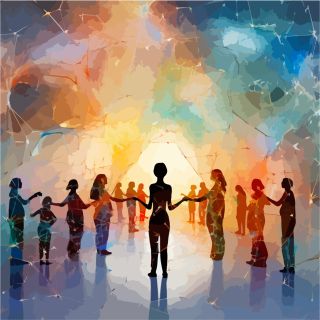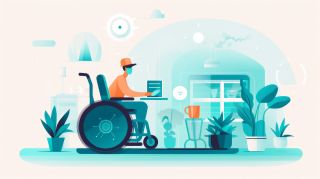Autism
The Independence Myth: Have We Pathologized Dependency?
A Personal Perspective: We devalue disabled people for their support needs.
Posted January 3, 2024 Reviewed by Lybi Ma
I once attended a live consultation group on countertransference, the therapist’s conscious and unconscious experience that arises in relation to the patient. I presented a couple I was seeing who wanted to adopt a child. The reason for adoption was that the husband was autistic, and the wife was afraid their child would be, too. As a parent of an autistic child, I talked with the group about my difficulty holding space for her experience when I found myself deeply connected to her husband’s pain around such rejection and feelings of annihilation.
Much can be dissected around this couple’s dilemma and my reaction. However, a seasoned psychologist in the group, in hearty camaraderie with the wife of this couple, proclaimed, “Well, that’s understandable; I mean, some autistic people will never be independent.”
I froze, unable to respond. My son’s life was just deemed worthless for the simple crime of needing help. My mind was suddenly awash with visions of his sweet face and whip-smart humor. But these now competed with intrusive images of eugenics propaganda brought on by my colleague's remark.
With just this one comment, I experienced the dehumanization of the inherent worth of all those who need support. I was left speechless by the implication that a child should not be born if they cannot live what is deemed an independent life. It is one thing to acknowledge one may not be an adequate parent to a disabled child and another to think this child shouldn’t exist if they can’t live on their own. This ideology is so deeply rooted in our cultural norms that it didn’t even seem odd to say it out loud.
Self-Determination with Support
Many children I know will never be independent by society’s standards. A more realistic goal is self-determination with support, as Jules Edwards and Megan Ashburn suggest in their book, I Will Die on This Hill. From the mother-infant dyad to international alliances, we are all dependent on support. Imagine the people you rely on in a given day, from the bus driver to the barista. Not to mention the add-ons that come with increasing privilege: cleaning people, gardeners, nannies, dog walkers, and others. These supports are considered acceptable, while assistance to carry out daily living skills is commonly deemed useless and a burden to society.
Rooted in Western psychology, the dominant culture of male narcissism and hierarchical worth has spanned the globe. As Terry Real, author and couple’s therapist, asserts in his book Us, “The culture of individualism blends with patriarchy and celebrates separateness and dominance. We live in an anti-relational, narcissistic society whose essence for centuries has been the one-up, one-down world of capitalist competition.”
There are many reasons why one might deny their dependency needs. For example, when we have been badly hurt in our early caregiving environment at the time of greatest vulnerability, we may take on a pseudo-self-sufficiency to protect our vulnerable selves. If you don’t need anyone, you can’t be hurt. And to need becomes shameful. But our needs do not go away, and they can come back to bite us in the form of destructive defenses that torpedo healthy relationships.
Fortunately, this individualistic paradigm has evolved in the psychological discourse. There has been a rise in relational models from attachment theory, relational psychoanalysis, interpersonal neurobiology, and field theory to reintroduce the interconnectedness of our human existence. It is an inescapable fact that we are neurologically intertwined.

Dan Siegel, psychiatrist and founder of interpersonal neurobiology, introduces new terminology in his book, Intraconnected, by coining the term “MWe,” the combination of me plus we. Siegel talks about the mental suffering that accompanies individualist cultures and the falsehood that the self is a separate entity. His work revitalizes the wisdom of Indigenous cultures and ancient contemplative teachings that challenge the role of the individual as the sovereign identity.
In the 1970s, disability activists launched the independent living movement. The first Center for Independent Living was started by Ed Roberts in Berkeley, California, and hundreds have sprung up around the country, inspired by the civil rights movement and based on the core values of dignity, peer support, consumer control, equal access, and advocacy.
From the mission statement of the Southern California Resource Services for Independent Living: “Independent Living refers to the concept that individuals with disabilities have the right to live their lives the way they choose, with the ability to ask for help if and when needed. This concept is frequently referred to as self-determination because it emphasizes the individual's right to make decisions independently and control their own life. It is a way of thinking that emphasizes the value of autonomy and empowerment for people with disabilities.” While the movement has incorporated the word independent, it seems more accurate to conceptualize this as healthy interdependence, with autonomy and self-determination as the core features.
As my husband and I look ahead to the end of my son’s high school years, I wonder if we can eliminate the stigma of dependence and empower every individual with the right to live a meaningful life with whatever level of support they need. It is possible to live a life of dignity that is both self-directed and supported.

References
Ashburn, M. & Edwards, J. (2023). I Will Die on This Hill: Autistic Adults, Autism Parents, and the Children Who Deserve a Better World. Philadelphia, PA: Jessica Kingsley Publishers.
Real, Terrence. (2022). Us: Getting Past You & Me to Build a More Loving Relationship. New York, NY: Rodale Books.
Siegel, Daniel J. (2022). Intraconnected: MWe (Me + We) as the Integration of Self, Identity, and Belonging. New York, NY: Norton Professional Books.




